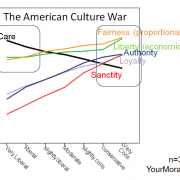Democracy in the Next Cycle of History
In this conversation with Long Now co-founders Stewart Brand and Kevin Kelly, Jonathan Haidt discusses the prospects for democracy in an age of spiraling polarization. He touches on technological optimism, morality vs ethics, teen mental health, possible social-media platform tweaks that could reduce the damage, and just how long this next cycle of history—where the Internet has disintegrated our consensus on reality—could last.
Jonathan Haidt is the Thomas Cooley Professor of Ethical Leadership at New York University’s Stern School of Business. A social psychologist whose research focuses on morality––its emotional foundations, cultural variations, and developmental course—he began his career studying the negative moral emotions but then moved on to the understudied positive moral emotions, such as admiration, awe, and moral elevation. He is the co-developer of Moral Foundations Theory, and author of The Righteous Mind (2012), and The Coddling of the American Mind (2018, co-authored with Greg Lukianoff). His next book will be Three Stories About Capitalism: The Moral Psychology of Economic Life expected in 2021, from Pantheon Press.
The Long Now Foundation is a nonprofit established in 1996 to foster long-term thinking. Their work encourages imagination at the timescale of civilization—the next and last 10,000 years—a timespan they call the long now. The foundation is home to a select group of projects which aim to foster long-term thinking. Many of the projects engage deep questions about preservation and continuity on long timescales. The Rosetta Project for example, has compiled an archive of thousands of human languages and fabricated an artifact, The Rosetta Disk, which can preserve that information accessibly for thousands of years. In 2016 the Long Now Foundation helped land one onto a comet for safekeeping, and in 2018, onto the moon. A few hundred copies have been distributed around the globe.









